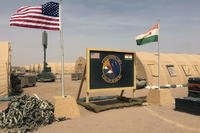A panel of senior ex-military and defense experts had no easy answers Wednesday for the near-term challenges of sequestration, world financial crisis, the U.S. military build-down or dealing with the future of Afghanistan. Over the long-term, however, they said things might turn out all right.
In a session convened by the Center for Strategic and International Studies, retired Air Force Gen. Ronald Fogleman acknowledged that the next few years might not be so pleasant for the U.S. and Afghanistan -- "The outlook is not all that good," he said. But he urged the audience to open its aperture.
"I look at the Korea experience," he said. "We came out of there with 'an armistice,' -- as opposed to a clear victory -- "y'know, it was 'a tie.' It was the first one we didn't, 'y'know, 'win.'" At the time, the U.S. was deeply divided after a long, costly war, and the immediate aftermath was not ideal for Koreans, either. (Especially those in the North.)
Fifty years later, however, Fogleman said he was in South Korea with some veterans of the war, who looked around at the country's progress and said, in his words: "I was glad I was here. I am glad the way this turned out. That may be the outcome for our troops" -- in Afghanistan -- "and it make take that long for that to happen. The public just has a short attention span."
Retired Army Gen. Peter Chiarelli said he took a much different, darker lesson from Korea: He repeated his worry that the coming defense build-down would result in another Task Force Smith: An ill-equipped, unprepared American ground force nearly being defeated early in a future war.
Chiarelli also implied our inability today to see down the line had a flip side: He quoted a "former chief of the United States Army, who will go unnamed," who told Chiarelli in the spring of 2003 that there would only be about three Army brigades left in Iraq by December of that year. At the time, Chiarelli was a little crestfallen, having just taken command of the 1st Cavalry Division and then learning he wouldn't be able to take it to war. As it turned out, he did, and the Army stayed in Iraq until 2011.
Afghanistan probably will not look like South Korea in 50 years. It probably will look very much like it does today, with more Chinese international mines; a perpetual Haiti-style presence by an alphabet soup of international aid organizations; and probably some contingent of foreign troops. Local warlords probably will rule large sections of it. It will probably not be a "Central Asian Roundabout" and few people in the year 2062 will confuse it with Switzerland.
Still, Fogleman is right, as far as it goes: If the Afghanistan of the future is a place where girls can go to school without being scarred or murdered; where a majority of the adult population can read; and which can deny the use of its territory by terrorists who hate civilization -- it will have been an improvement. Whether that outcome will have been worth the price is one we can't yet answer.
What do you think?








